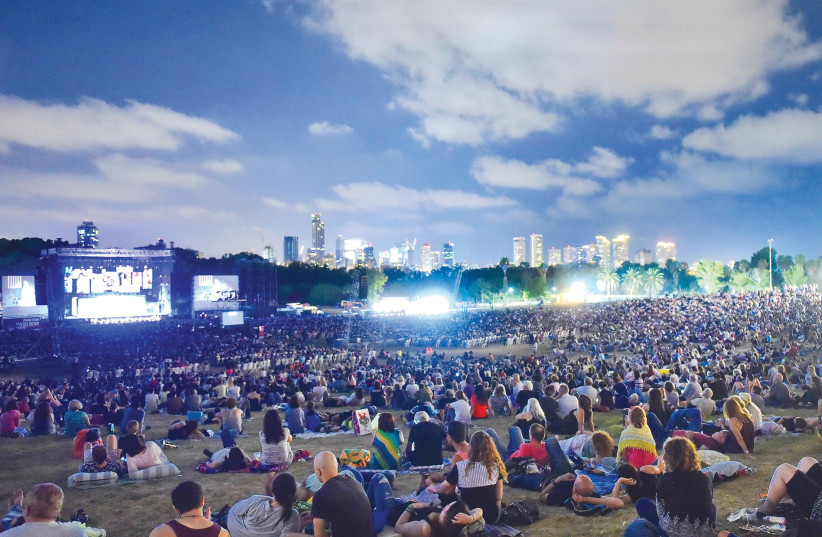Tel Aviv’s mayor, Ron Huldai, began the tradition in 2001 at Rabin Square. Dan Ettinger, led the Israel Symphony Orchestra Rishon LeZion in a beautiful, though abbreviated, performance.
Japanese neon signs flickered above Pinkerton (tenor Joseph Dennis), an American naval officer in Nagasaki, as he explained to United States consul Sharpless (baritone Oded Reich) that he intended to playfully wed a teenage Japanese girl (Madama Butterfly).
Reich, bearded and armed with a cane, warns him that “it would be a great sin to strip off such delicate wings.” Pinkerton, lustful and confident, is deaf to this advice.
Dennis has an exceptionally warm, engaging voice. Here he plays the cad but we cannot truly hate Pinkerton. The deep-sounding Reich, who stood opposite Dennis across the great length of the outdoor stage, was perfectly cast. The two men walked towards each other and sang, and we immediately knew who was who in this tale.
Pinkerton haughtily ignored the words of advice of Suzuki (Shay Bloch) – the young woman who served Madama Butterfly (Alla Vasilevitsky) – about how to treat others. He also ignored what his own bride had to say. This became glaringly painful when Butterfly implores him to: Vogliatemi bene, un bene piccolino/ un bene da bambino ("Love me with a little love/ a child-like love") while he unwrapped her clothes as if she were a toy delivered in a box.
Tenor Eitan Drori excelled as the sleazy matchmaker, Goro. Director Gadi Schechter deserves a nod for this gimmick, as it gave Puccini’s words about una casetta che obbedisce a bacchetta ("a house that works by magic") a very current touch, with both men swiping the various designs on the hand-held device and pressing the screen.

20 years of Opera in the Park
Vasilevitsky, a gifted soprano, gave a heart-wrenching performance. In the role of Cio-Cio San, meant to vacillate between child-like innocence and nearly Madonna-like love and devotion, she shone like the full moon above the park.
When she dropped the ottoke (Japanese ritual dolls representing the ancestors) and turned to hold Pinkerton, we sensed she was a terrified child who gave up everything she had for this "Yankee vagabond.”
In the second act, she appeared wearing a pink western-style dress on a stage that was cleverly split in two, with an American home on the right, with Old Glory and chairs, and a Japanese home on the left, with Japanese calligraphy hung on the wall. Pigri ed obesi son gli dei giapponesi! ("Lazy and fat are the Japanese Gods") Cio-Cio San told her maiden Suzuki, who wore a kimono, then she added: L’americano Iddio, son persuasa, ben più presto risponde ("the American god, I am sure, is much faster in responding").
Artistic touches such as these contributed to, making the opera even more visually stunning, thanks also to the large video screens placed above the stage which, at key points, depicted Japanese calligraphy, and other Japanese visuals like the cherry blossom.
Pinkerton did not return to his little butterfly.
Choir members, dressed in kimonos and carrying lanterns descended from the stage and faced the audience with white-caked faces. The lamps shone as they, like Diogenes looking for a human being, searched for “a man poor but wise” who might save “the city by his wisdom” (Ecclesiastes 9:15). Not finding anyone, they returned to finish the performance. The stage was pulled back, a black curtain was draped behind Vasilevitsky, and she, in her last moments, became fully Japanese in a horrific – yet honorable – manner.
Hundreds of thousands of people have enjoyed various operas during the 20 years run of Opera in the Park, from The Magic Flute (2011) to Nabucco (2018).
“Without democracy,” Huldai said, “there is no culture, without culture, there can be no democracy.” True enough.
Yet, there is more to it than the simple election-year public relations canned sound bites about the first Hebrew city being a bastion of freedom.
Like Madama Butterfly, many Israelis put their trust in the American gods of democracy and equality, we can only hope that one small, yet highly unusual country on the Asian continent will not meet the fate of Puccini’s heroine.
Puccini’s Madama Butterfly, is available online at fb.watch/mdbaSPCM8J https://fb.watch/mdbaSPCM8J/.
